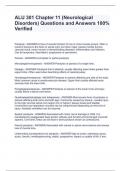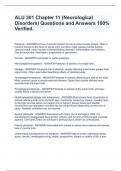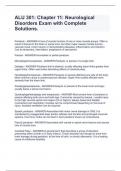Alu 301 chapter 11 stuvia - Study guides, Class notes & Summaries
Looking for the best study guides, study notes and summaries about Alu 301 chapter 11 stuvia? On this page you'll find 3 study documents about Alu 301 chapter 11 stuvia.
All 3 results
Sort by

-
ALU 301 Chapter 11 (Neurological Disorders) Questions and Answers 100% Verified
- Exam (elaborations) • 10 pages • 2024
-
Available in package deal
-
- $10.99
- + learn more
ALU 301 Chapter 11 (Neurological Disorders) Questions and Answers 100% VerifiedALU 301 Chapter 11 (Neurological Disorders) Questions and Answers 100% VerifiedALU 301 Chapter 11 (Neurological Disorders) Questions and Answers 100% Verified Paralysis - ANSWER-A loss of muscle function of one or more muscle groups. Often a result of trauma to the brain or spinal cord, but other major causes include tumors, vascular insult, motor neuron or demyelinating diseases, inflammation and infection. Can be t...

-
ALU 301 Chapter 11 (Neurological Disorders) Questions and Answers 100% Verified.
- Exam (elaborations) • 10 pages • 2024
- Available in package deal
-
- $13.99
- + learn more
Paralysis - ANSWER-A loss of muscle function of one or more muscle groups. Often a result of trauma to the brain or spinal cord, but other major causes include tumors, vascular insult, motor neuron or demyelinating diseases, inflammation and infection. Can be temporary, intermittent, progressive or permanent. Paresis - ANSWER-Incomplete or partial paralysis. Monoplegia/monoparesis - ANSWER-Paralysis or paresis of a single limb. Diplegia - ANSWER-Paralysis that is bilateral, usually affe...

-
ALU 301: Chapter 11: Neurological Disorders Exam with Complete Solutions.
- Exam (elaborations) • 10 pages • 2024
- Available in package deal
-
- $13.49
- + learn more
Paralysis - ANSWER-A loss of muscle function of one or more muscle groups. Often a result of trauma to the brain or spinal cord, but other major causes include tumors, vascular insult, motor neuron or demyelinating diseases, inflammation and infection. Can be temporary, intermittent, progressive or permanent. Paresis - ANSWER-Incomplete or partial paralysis. Monoplegia/monoparesis - ANSWER-Paralysis or paresis of a single limb. Diplegia - ANSWER-Paralysis that is bilateral, usually affe...

How much did you already spend on Stuvia? Imagine there are plenty more of you out there paying for study notes, but this time YOU are the seller. Ka-ching! Discover all about earning on Stuvia


